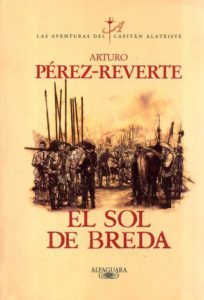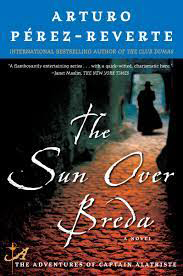Home »

The Sun Over Breda is a strong and interesting work
Book Review
By Derryll White
Perez-Reverte, Arturo (2007). The Sun Over Breda.
In war, come what may,
There is much I can say,
If a man has two hands
Gold will surely roll his way.
-Bartolomé Torres Naharro
 Perez-Reverte is very clear here in describing the outlook and attitude of the Spanish soldiers. And in doing so he lays ground for the understanding of the Spanish male today. Aggressive, loud and volatile, they also turn off the anger as soon as the incident is past.
Perez-Reverte is very clear here in describing the outlook and attitude of the Spanish soldiers. And in doing so he lays ground for the understanding of the Spanish male today. Aggressive, loud and volatile, they also turn off the anger as soon as the incident is past.
This book is part of a continuing series featuring Captain Alatriste and the page Inigo. It looks convincingly at the ignorance of wealth, the monarchy and the Church in meeting the basic needs of the men who fought to uphold that society. The author is very hard on Spanish history, upholding the commitment and honour of the common soldier and being scathing in his renunciation of king and court.
He writes passionately of a duty fulfilled, of honour won and known through the pain and horror of hand-to-hand battle. His description of death and loss is as touching as anything I have ever read. To acknowledge an aching heart, a mother’s lament, brings the horror of war close to hand.
Arturo Perez-Reverte proudly and shamelessly offers a paean to the Spanish foot-soldier, the stalwart infantry that fought, aside from royal court and church, for the belief in their country and themselves. He articulates a Spain still visible today. Not the castles and cathedrals but the brotherhood, the tenderness with which a child is greeted by men already in their prime and done with childish things. Historically, politically and socially ‘The Sun Over Breda’ is a strong and interesting work. And the attention to 17th century poetry is an unexpected treat.
he who leaves the offender alive also leaves alive his vengeance
********
SPANISH LEGACY – But yes, there is this: We fucked them good and hard. Even though our men and their generals were no equal to those in the days of the Duque de Alba and Alejandro Farnesio, Spanish soldiers continued to be Europe’s nightmare for some time: they who had captured a French King in Pavia, triumphed in San Quintin, sacked Rome and Antwerp, taken Amiens and Ostende, killed ten thousand enemies in the attack on Jemmigen, eight thousand in Maastrich, and nine thousand in Sluys, wielding steel in water up to their waists. We were the very wrath of God, and it took only one glance at us to understand why: We were a rough and rowdy horde from the dry lands of the south, fighting in hostile foreign lands where there was no possible retreat and defeat meant annihilation.
CIVILITY – And I have already rated on this subject that more than a few soldiers, whether they were old, mutilated, or with long campaign records stashed in the tubular containers they carried, hard to beg in the streets and squares of our mean-spirited Spain, where again and again the same people amassed wealth while those who had given their health, blood, and life to preserve the true religion, the estates, and the wealth of our monarch remained buried and forgotten.
POLITICS – Because while Spinola reaped victories for the king, who was ungrateful like all the kings the world has ever seen, enemies were cutting the ground from beneath his feet at court, far from the fields of battle, discrediting him before the monarch of languid gestures and pallid soul, who, good natured but weak, always managed to find himself where honourable wounds were being received. Instead of adorning himself in the appurtenances of war, this king dressed for palace balls….
JUDGEMENT – As reward for his noble endeavors he received the standard wages our land of cains – more stepmother than mother, ever base and miserly – holds for those who love her and serve her well: oblivion, the poison engendered by envy, ingratitude, and dishonour.
MACHISMO – In Spanish, the word reputation was, in those days, a very weighty word. Not for nothing had we Spaniards fought for a century and a half in Europe, ruining ourselves to defend the true religion and our reputation, while the Lutherans, Calvinists, Anglicans and other accursed heretics, despite spicing their stew with a lot of Bible and freedom of thought, had fought so that their merchants and their companies in the Indies could earn more money. Reputation was of little concern to them if it did not offer practical advantages.
MODERN WARFARE – He who kills from afar knows nothing at all about the act of killing. He who kills from afar derives no lesson from life or from death; he neither risks nor stains his hands with blood, nor hears the breathing of his adversary, nor reads the fear, courage or indifference in his eyes. He who kills from afar tests neither his arm, his heart, or his conscience, nor does he create ghosts that will later haunt him every single night for the rest of his life. He who kills from afar is a knave who commends to others the dirty and terrible task that is his own.
 – Derryll White once wrote books but now chooses to read and write about them. When not reading he writes history for the web at www.basininstitute.org.
– Derryll White once wrote books but now chooses to read and write about them. When not reading he writes history for the web at www.basininstitute.org.








